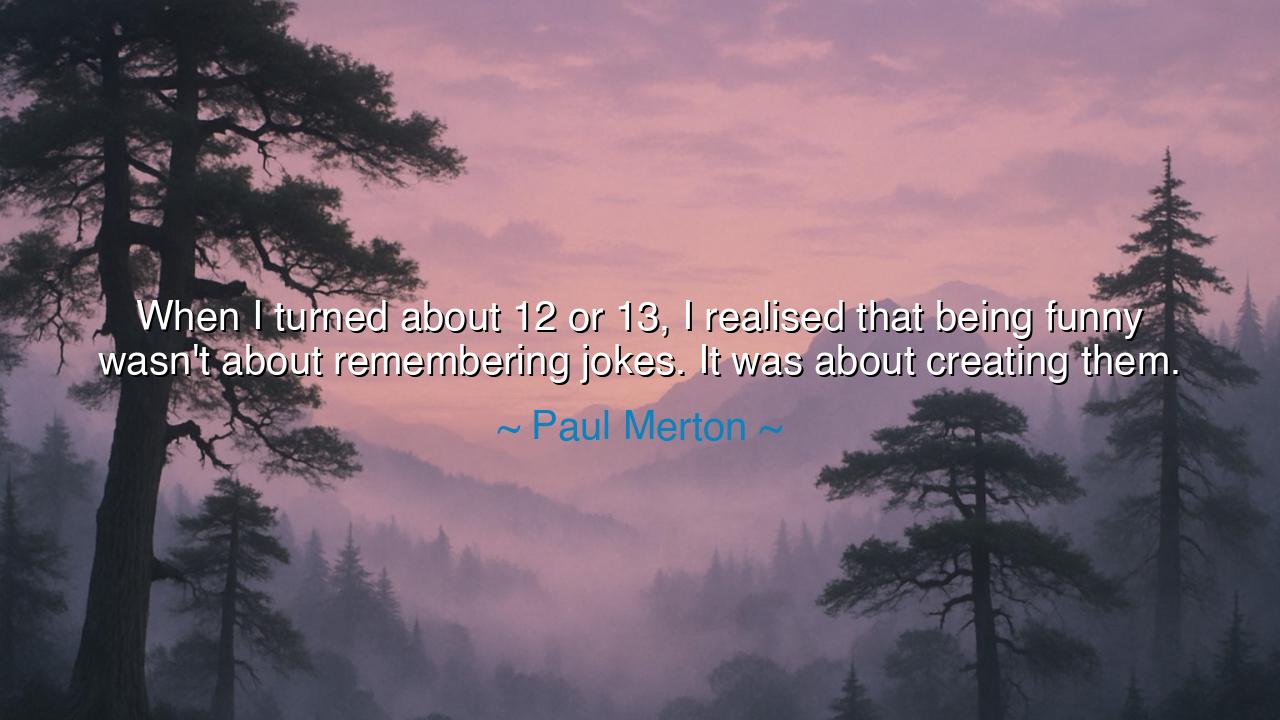
When I turned about 12 or 13, I realised that being funny wasn't
When I turned about 12 or 13, I realised that being funny wasn't about remembering jokes. It was about creating them.






When Paul Merton said, “When I turned about 12 or 13, I realised that being funny wasn't about remembering jokes. It was about creating them,” he was not merely speaking of comedy — he was speaking of the birth of imagination. Beneath his words lies a truth older than art itself: that true creativity does not live in repetition, but in origination. What he discovered in youth is the same awakening that every artist, philosopher, and dreamer must face — that to create is to breathe life into the world, not simply to echo it. The difference between remembering and creating, between imitation and invention, is the difference between the moon and the sun: one reflects light, the other produces it.
The origin of this reflection comes from Merton’s own journey through humor and performance. Known as one of Britain’s great improvisational comedians, he began, like many others, by admiring those who could make people laugh. As a child, he likely repeated the jokes he had heard, believing that humor was a thing one could possess, a treasure memorized and shared. But as he grew, he understood that the true power of comedy — and of all artistry — lay in creation, in the moment of inspiration that transforms the ordinary into the extraordinary. At twelve or thirteen, his realization was not just about laughter; it was a spiritual revelation: that authenticity begins when one stops imitating and starts inventing.
In the ancient world, this truth was revered as a form of divine madness. The Greeks believed that muses whispered in the ears of poets and playwrights, granting them the sacred fire of creation. To remember the words of others was common; to bring forth new words from the silence was godlike. The philosopher Plato called this act “inspired madness” — a possession by truth and beauty that mere memory could never produce. And so it is with Merton’s discovery. The child who repeats jokes may bring laughter, but the one who creates them births a new form of joy. He becomes a vessel of spirit, transforming life’s small absurdities into wisdom, using laughter as the language of revelation.
There is, too, a deeper meaning in his contrast between remembering and creating. To remember jokes is to rely on what is already known — to walk in the footsteps of others. But to create them is to step into the unknown, to risk failure, silence, or misunderstanding. True humor, like true art, demands courage. It requires faith in one’s own mind, one’s own vision, one’s own rhythm of truth. The world’s great jesters and philosophers have always shared this bravery. Socrates, with his irony, made Athens laugh while revealing its ignorance; Oscar Wilde, centuries later, made society giggle as he dismantled its hypocrisies. In their humor was rebellion — and in that rebellion, creation.
Consider the story of Charlie Chaplin, that immortal figure of silent comedy. When he began, he did not tell jokes — he was the joke, the mirror of humanity’s clumsiness and grace. Every stumble, every glance, every twitch of his face was an act of creation. He did not rely on punchlines memorized from others; he wrote the poetry of laughter with his body. Like Merton, he understood that humor is not recitation, but revelation — the art of exposing truth through play. And though the world called him “funny,” what he truly was, was wise. For laughter, at its highest form, is not escape — it is enlightenment delivered gently to the heart.
What Merton speaks of, then, is not simply the difference between telling and creating, but between imitating life and participating in it. The one who remembers jokes stands outside the world, observing it; the one who creates them steps inside, reshaping it. This is the calling of every artist: to take the raw material of experience — the awkwardness, the pain, the wonder, the absurd — and transform it into something that reflects truth. To create humor is to hold up a mirror and say, “Here we are — foolish, brave, and endlessly human.” It is an act not only of wit, but of compassion, for in laughter we recognize ourselves and forgive our own frailty.
So, my children, learn from Paul Merton’s revelation. Do not merely repeat what you have heard, no matter how clever or comfortable it seems. The world already has enough echoes; what it needs are new voices. Create — not only in art, but in thought, in kindness, in the way you live. Let your words, your work, your laughter be born from truth, not imitation. For memory preserves what has been, but creation summons what might yet be. To create, as Merton discovered at the threshold of adolescence, is to awaken the divine within — the spark that transforms observation into insight, and repetition into genius.
And remember this, above all: to create is to live fully. The child who learns to invent, not recall, becomes the adult who shapes worlds instead of merely inhabiting them. Whether through humor, craft, or courage, strive always to be the one who brings new light into being. For those who dare to create — to speak, to write, to laugh their own truth into existence — join the eternal lineage of those who have kept humanity’s fire burning bright across the ages.






AAdministratorAdministrator
Welcome, honored guests. Please leave a comment, we will respond soon